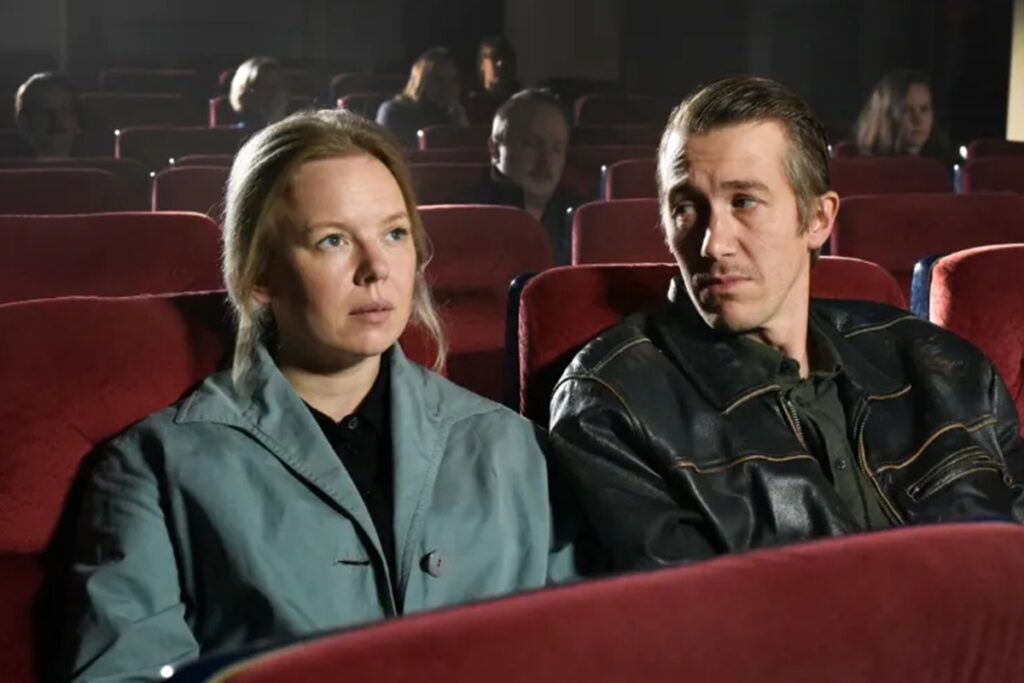Another Dry and Masterful Finnish Delight, for Our Consideration
Master Finnish Director Aki Kaurismäki Delivers Another Treasure with the Sweet, Droll ‘Fallen Leaves,’ Now at Santa Barbara’s Riviera Theatre

Master Finnish Director Aki Kaurismäki Delivers Another Treasure with the Sweet, Droll ‘Fallen Leaves,’ Now at Santa Barbara’s Riviera Theatre

Aki Kaurismäki, the king of droll in Finnish cinema and the film world, generally, is at it again. Rumor had it that the great Finnish director was threatening retirement after his previous film The Other Side of Hope, released in 2017, which would have been a shame. Who else in world cinema could take his place, as a reigning purveyor of understated wit and sneak-attack wisdom in world cinema?
And who else could have concocted a love story as deadpan and lovely as Fallen Leaves? Strangely, this could be the finest, driest, and most sentimentality-averse love film of the year, and clearly deserving of a spot in the proverbial Top 10 list (at least mine).
In this simple, sweet curveball film, the 20th title in Kaurismäki’s wonderous and woozy filmography and part of its “proletariat series,” our fate-destined midlife lovers — the introverted store clerk Ansa (Alma Pöysti) and a boozy but good-hearted construction worker Holappa (Jussi Vatanen) — circle around each other in loopy, noncommittal patterns. The magnetism is there, but pride and life circumstances keep throwing up hurdles. Love grows during a coma. Drunken behavior gets in the way of a good time and a hoped-for future. But hope is ever the pilot light in the narrative.
Kaurismäki’s trademark style, which both influenced and resonated with such directors as Todd Haynes, Jim Jarmusch, Rainer Werner Fassbinder, and his hero Robert Bresson, lays out his story in a mode of artful melodrama, with the drama freeze-dried. His stories may seem small and slight, the characters from unremarkable corners of society, but the uniquely understated charm of the storytelling voice carries the day.
Private and global realities are cleverly juxtaposed, as the daily affairs and upsets in Helsinki (each character is fired at various points, for instance) are interspersed with news reports of the unfolding Ukrainian war tragedies. He musters up courage to take her to the movies. As a cinema in-joke, the film they catch is Jarmusch’s arty zombie flick The Dead Don’t Die, and a moviegoer in the periphery makes a comment after the screening: “Great film. Reminds me of Bresson’s Diary of a Country Priest.”
Filmic pleasures and sly cross-references line the story’s path, as always in Kaurismäki land. Ansa’s dog goes by the name Chaplin. Too little is made of the critical importance of the visual aura created by his longtime cinematographer ally Timo Salminen, who sets up visually beautiful, composed (in more ways than one), and minimal ways — which works in tandem with a sensibility oddly related to the darker-themed French director Bresson, in fact. The difference being that Kaurismäki is a comic — and tragicomic — force to be reckoned with, albeit with deadpan mastery. Who would figure that Kaurismäki, on the top of his game at 66, could deliver a thinking person’s/film geek’s holiday treat? In fact, for a certain audience type, Fallen Leaves may be the perfect date flick this holiday season.
Please note this login is to submit events or press releases. Use this page here to login for your Independent subscription
Not a member? Sign up here.